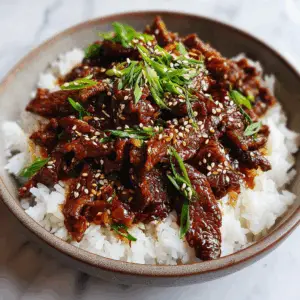
Sweet and Savory Korean Bulgogi Marinade with Pear
Equipment
- Grater or food processor for the pear, onion, ginger, and garlic
- Mixing bowl preferably non-metallic to avoid affecting the flavor of the marinade
- Whisk or Fork to emulsify the ingredients
- Glass jar or airtight container for storing the marinade if prepping ahead
- Zip-top Bags or Shallow Dish for marinating the meat
- Cast iron skillet, grill pan, or outdoor grill for cooking the marinated meat
Ingredients
Base Ingredients
- 1 Asian pear peeled, cored, and grated (can substitute with Bosc pear if needed)
- 1 small yellow onion grated
- 4 cloves garlic minced
- 1 thumb-sized piece of fresh ginger grated
- 1/3 cup soy sauce use low-sodium if preferred
- 2 tablespoons sesame oil
- 2 tablespoons brown sugar
- 1 tablespoon honey
- 2 tablespoons rice vinegar or mirin for a slightly sweeter version
- 1 tablespoon gochugaru Korean red pepper flakes, optional for spice
- 2 teaspoons freshly ground black pepper
- 2 tablespoons water to thin the sauce if necessary
- 2 stalks green onions finely chopped
- 1 tablespoon toasted sesame seeds optional, for garnish
Optional Add-Ins for Customization
- 1 tablespoon sake or Korean cooking wine for depth
- 1 teaspoon fish sauce for added umami
- 1 tablespoon grated apple if you don’t have enough pear
- 1 teaspoon cornstarch mixed with water if using marinade as a glaze
Instructions
Step 1: Prep Your Aromatics
- Start by peeling and grating your Asian pear and onion into a bowl. This gives the marinade its signature sweetness and moisture. Add the minced garlic and grated ginger next.
Step 2: Mix the Liquid Base
- To the bowl, add soy sauce, brown sugar, honey, sesame oil, and rice vinegar. Use a whisk or fork to combine everything until the sugar dissolves. The consistency should be thick but pourable.
Step 3: Add Seasonings
- Now stir in the gochugaru, black pepper, chopped green onions, and optional toasted sesame seeds. Give everything a good stir and let it sit for 5–10 minutes for the flavors to meld.
Step 4: Marinate Your Protein
- Place your protein of choice—thinly sliced beef sirloin, boneless pork shoulder, or skinless chicken thighs—into a zip-top bag or shallow dish. Pour the marinade over, ensuring every piece is coated. Refrigerate for at least 2 hours, ideally overnight for the best results.
Step 5: Cook It Up
- Heat a cast iron skillet or grill pan over medium-high heat. Add a bit of oil and sear the meat in batches to avoid overcrowding. Cook each side until caramelized and slightly charred—about 2–3 minutes per side depending on thickness.
Step 6: Optional Glaze
- For a glossy finish, take a bit of the leftover bulgogi marinade, simmer it with a touch of cornstarch slurry, and brush it over the cooked meat just before serving.